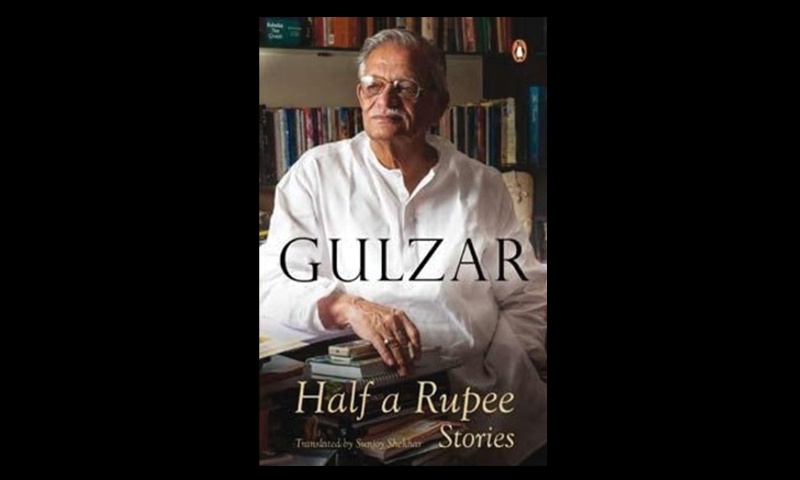Nevertheless, the collection, translated by Sunjoy Shekar, has a promising start. It’s first section (it is divided into eight) comprises real-life stories about veteran journalist and peace activist Kuldip Nayyar and Hindi film lyricists and poets Sahir Ludhianvi and Javed Akhtar.
An unforgettable story, ‘Sahir and Jaadu,’ deals with the special bond between Jaadu, (Javed Akhtar) and Sahir (Ludhianvi). Because of Jaadu’s difficult relationship with his father, Jan Nisar Akhtar, Sahir played the role of a surrogate parent to Jaadu. Often Jaadu would barge into Sahir’s house and vent against his father, with Sahir patiently hearing him out, and all the while nudging him to eat some food, just like any concerned parent would do. With both possessing strong personalities they also had their tiffs but would soon make up. It was during one of these fights that an in-joke developed between the two about a 100-rupee note and Gulzar skillfully shifts the story’s mood to poignancy related to this note.
In this story based on actual incidents and real people, Gulzar beautifully sketches characters that instantly come alive in one’s mind. Moreover, since both Ludhianvi and Akhtar are significant names known for their immense contribution to Hindi film music, with Sahir arguably ranking the highest in the pantheon, reading about them was a pleasurable experience, which also indicated the skill of the translator.
In ‘Kuldip Nayyar and Pir Sahib,’ Nayyar reminisces about his hometown Sialkot when he visits the Wagah border with Gulzar on August 14. We learn that all of Nayyar’s paternal relatives lived next to each other in Sialkot and near their residence was a big Pipal tree under which was the grave of Pir Baba, a saint venerated highly by his mother. Her belief in him was so strong that whenever she had to make a decision or have a question answered she would invoke Pir Baba who would come in her dreams, telling her what to do. Nayyar would be nudged by his mother to bow before the holy man’s grave, especially before his school and college exams. After Partition, though Nayyar’s family came to India his mother’s faith in Pir Baba continued. As Nayyar became an adult he outgrew his belief but when he was going through a difficult period in his life and had lost all hope he invoked his mother’s Pir Baba. He tells Gulzar that Pir Baba appeared in his dream and gave him a positive sign.
On the surface the story seems to be about Partition and the consequent losses suffered by an affected family but it also delves into a mother-son relationship and beliefs independent of religious affiliations.
The next section of the collection deals with characters living in Mumbai and is a tribute of sorts to the resilience of people living in shantytowns, slums and on footpaths. ‘The Charioteer’ is a particularly moving story about Maruti, a sweeper on a ferry, who has to do back-breaking work for 10 hours every day. He is a mehtar, from the lowest caste, and has to clean the vomit of those travelling in the ferry. But when he reaches home each evening and is surrounded by his family, his tiredness ebbs away.
From then on, the stories lose their punch. The third section particularly has strong overtones of Aman Ki Asha. That in itself may not necessarily be a bad thing but due to an upsurge of similar types of narratives on television and in print journalism, the stories in this section read like tired clichés.
Other stories are based in Kashmir, Bengal and Afghanistan, all harping on more or less similar themes such as the fallout of insurgent movements on the innocent, the benevolence of strangers in unknown terrains and the futility of war. Also, there are scenes and dialogues in some stories that read more like movie screenplays. One example is the story ‘Hilsa’ about a middle-aged couple, Vibhuti and Kanchan. Their playful banter seems straight out of a 1980s Hindi movie.
Then there are stories such as ‘Farewell’ that begin well but don’t continue with the promise. ‘Farewell’ revolves around a student leader, Gorakh Pandey, who leads the Naxalbari movement at a university. His namesake in the hostel ends up mistakenly receiving secret messages under the doormat of his room. The namesake reads these messages but is unable to do anything about them. However, his apolitical personality slowly starts to undergo a change when he reads up on the movement and discusses it with his friends. The story ends abruptly when one night the police raid his hostel and it is discovered that the Naxalite leader was living next to the room of the namesake all this time. The end fails to leave an impact and this is true for other stories in the collection as well.
Some could argue that addressing real-world issues in his short stories is important for Gulzar and that is a valid point. However, I wish that within this framework he had experimented with words, created unlikely characters and used humour, all of which he has done in his films and songs. n
The reviewer is a Dawn staffer
Half a Rupee: Stories
(SHORT STORIES)
By Gulzar
Translated by Sunjoy Shekar
Penguin Books, India
ISBN 9788184757613
232pp.
















































Dear visitor, the comments section is undergoing an overhaul and will return soon.